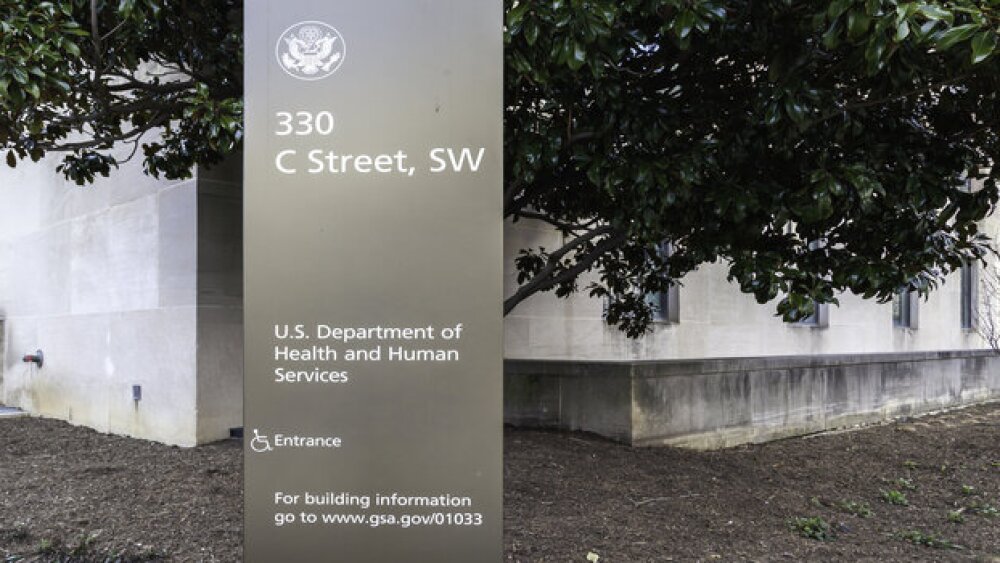The Biden administration on Tuesday released a much-anticipated list of the first 10 medicines included in Medicare’s Drug Price Negotiation Program under the Inflation Reduction Act.
Pictured: Department of Health & Human Services sign at headquarters/iStock, JHVEPhoto
The Centers for Medicare and Medicaid Services identified on Tuesday the first 10 prescription medicines that will be affected by Medicare’s Drug Price Negotiation Program under the Inflation Reduction Act.
Signed into law by President Joe Biden in August 2022, the Inflation Reduction Act (IRA) aims to generate some $25 billion in drug cost savings for the U.S. government over the next eight years. To this end, the IRA enables CMS to renegotiate prices for some of the most widely prescribed medications, which will take effect in 2026.
Tuesday’s list of the first 10 prescription medicines that will be affected by the Drug Price Negotiation Program—in order of gross Medicare Part D spending from June 2022 to May 2023—includes:
- BMS’ Eliquis (apixaban), used for the prevention and treatment of blood clots
- Eli Lilly’s Jardiance (empagliflozin), indicated for heart failure and diabetes
- J&J’s Xarelto (rivaroxaban), also used for blood clots and for reducing stroke risk
- Merck’s Januvia (sitagliptin), a diabetes drug
- AstraZeneca’s Farxiga (dapagliflozin), also for heart failure and diabetes, as well as chronic kidney disease
- Novartis’ Entresto (sacubitril/valsartan), a heart failure drug
- Amgen’s Enbrel (etanercept), approved for psoriasis, rheumatoid arthritis and psoriatic arthritis
- J&J’s Imbruvica (ibrutinib), used to treat blood cancers
- J&J’s Stelara (ustekinumab), also indicated for psoriasis and psoriatic arthritis, as well as Crohn’s disease and ulcerative colitis
- Novo Nordisk’s Fiasp and NovoLog, insulin products indicated for diabetes
“For the first time, the law provides Medicare the ability to directly negotiate the prices of certain high expenditure, single source drugs without generic or biosimilar competition,” CMS said in Tuesday’s announcement.
In choosing these medicines, the agency looked at therapies that had the highest total Part D gross coverage, particularly those without generic or biosimilar competition. Collectively, these medicines cost the U.S. government some $50 billion from June 2022 to May 2023, according to a CMS factsheet posted Tuesday.
J&J in an emailed statement to BioSpace said the IRA’s price control provisions “will constrain medical innovation, limit patient access and choice, and negatively impact overall quality of care,” adding that “seniors could face bureaucratic barriers to access and potentially higher out of pocket costs even with the IRA’s out-of-pocket cost limits for Part D drugs.”
While Novo Nordisk in statement said it “supports policies to ensure patients can afford their medicines,” the company has “seen CMS take aggressive steps to carry out unilateral price setting without consideration for the impact on patients living with chronic disease or the overall healthcare system.”
In an emailed statement to BioSpace, Merck said that these “price-setting provisions are bad policy that will stifle the U.S. biopharmaceutical sector’s research and development and have potentially devastating consequences for the millions of patients who need new therapeutic options.”
However, Mara Goldstein, managing director of Mizuho Securities, told BioSpace in an emailed comment that the impact of the Medicare Drug Price Negotiation Program on Merck would likely be “limited” given that Januvia is set to lose its exclusivity in 2026.
“We’d note that other drugs on this list also lose exclusivity suggesting minimal commercial impact,” Goldstein said. “Our expectation was that the list would be focused on metabolic/diabetes and other chronic use medications so we were not surprised to see the complexion of this list.”
CMS also excluded certain orphan drugs and products coming from small biotech companies from its initial list.
Biopharma companies have challenged the IRA’s Drug Price Negotiation Program, by questioning the law’s constitutionality and flagging its potentially chilling effects on innovation. Merck started the legal salvo in June 2023 when it filed the first lawsuit seeking to block the program. It has since been followed by BMS, J&J and Astellas, Boehringer Ingelheim and AstraZeneca.
Novartis shared a similar sentiment in an emailed statement to BioSpace calling the IRA’s negotiation provision “unconstitutional.”
Tristan Manalac is an independent science writer based in Metro Manila, Philippines. He can be reached at tristan@tristanmanalac.com or tristan.manalac@biospace.com.






